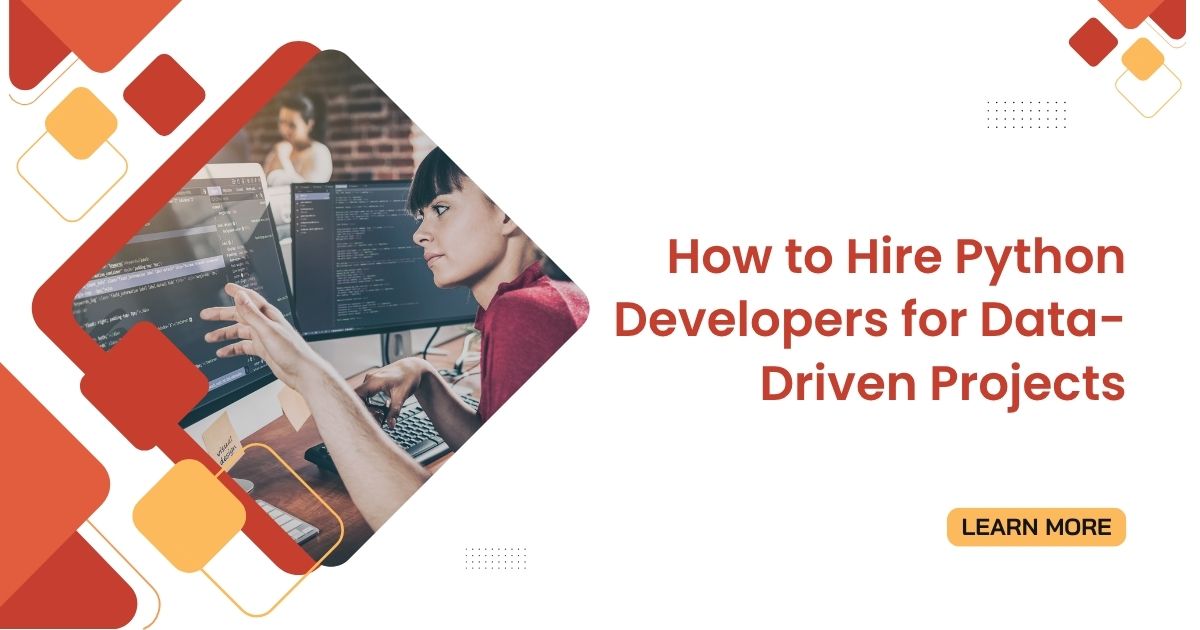How to Hire Python Developers for Data-Driven Projects
Data-driven strategies now dominate decision-making across industries. Recent trends indicate that technical roles involving Python Developers have surged in demand, as organizations generate and analyze ever-growing volumes of data. According to global workforce data, Python ranks as one of the top three most-requested programming languages in job postings related to analytics and data science. Hiring managers consistently face strong competition for developers who can transform raw data into valuable business insights.
If your goal is to hire Python developers or hire Python experts suited for data-focused tasks, it is essential to follow a targeted process. Below is a comprehensive guide outlining skills, interview methods, and practical steps to find and select the right talent for your data-driven team.
Essential Python Developers Skills for Data Projects
Core Programming Abilities
- Advanced knowledge of Python 3 standard library
- Clean, readable coding style and use of industry conventions
- Proficiency with built-in data structures and object-oriented programming
Data Science Proficiencies
- Manipulating large datasets with libraries like Pandas and NumPy
- Performing exploratory data analysis with statistical functions
- Familiarity with data visualization tools, e.g., Matplotlib, Plotly
- Experience in implementing machine learning algorithms (scikit-learn, TensorFlow, PyTorch)
Data Engineering and Architecture
- Building and managing ETL (extract-transform-load) pipelines
- Integrating data from SQL/NoSQL sources (PostgreSQL, MySQL, MongoDB)
- Knowledge of cloud-based storage and compute environments, e.g., AWS S3, Google BigQuery
Testing and Deployment
- Writing unit and integration tests for data processing code
- Using version control (Git) and CI/CD systems
- Packaging code for deployment in production environments
Communication and Collaboration
- Translating technical analysis into clear, actionable reports
- Working within interdisciplinary teams, often alongside statisticians or product managers
- Understanding business objectives and translating them into technical requirements
Key Steps to Hire Candidates Matching Data Project Needs
1. Define Project Objectives and Complexity
Begin with a clear understanding of your project’s requirements:
- What types of data will you process (structured, unstructured)?
- Do you need advanced analytics (predictive modeling, AI), or primarily reporting/visualization?
- Will the developer join an established team or work more independently?
Write these specifications in detail before you post any job ads or contact potential hires.
2. Write a Precise, Technical Job Description
Clearly list the technical skills and experience your project requires. Example sections may include:
Technical Requirements
- Proficient in Python 3 for data analysis and engineering
- Experience with machine learning frameworks and/ or big data tools
- Familiarity with cloud services for scalable data solutions
Non-Technical Requirements
- Strong written and verbal communication skills
- Demonstrated teamwork and willingness to take ownership
Preferred Experience
- Contributions to open-source data science projects
- Prior work on similar data-driven products
3. Sourcing Talent: Methods and Channels
There are several ways to find qualified Python Developers talent for data projects:
- Technical job boards focused on programming and data roles
- Referrals from trusted network contacts
- Reviewing publicly available code samples (e.g., open-source repositories)
- Technical recruiter partnerships specializing in analytics roles
Tailor your sourcing strategy to the expertise and seniority level required.
4. Screening and Technical Assessment
Evaluate candidates through more than just resumes. Steps include:
Portfolio and Resume Review
- Look for direct work with data pipelines, analysis, ML integration
- Evidence of completed, relevant projects
Technical Challenge
Sample assessment tasks might include:
| Task | What You Learn |
| Cleaning and transforming a raw dataset | Data wrangling proficiency |
| Designing a simple predictive model | Machine learning fundamentals |
| Visualizing results in code | Communication of technical findings |
Keep exercises time-bounded and focused on the key challenges of your domain.
5. Conduct Behavioral and Problem-Solving Interviews
Ask practical, scenario-based questions:
- How would you handle missing data in a critical dataset?
- Can you design a robust process to automate data ingestion, transformation, and storage?
- Describe a time you resolved a conflict or ambiguity in project requirements.
This helps gauge not only technical depth but also adaptability and communication skill.
6. Confirm Fit and Offer Terms
Finally, assess cultural fit and clarify expectations. Ensure your offer matches market compensation and addresses remote or hybrid work preferences when relevant.
Technical Skills Matrix for Hiring Python Experts
| Skill Area | Junior | Mid-Level | Senior/Lead |
| Python Coding | Basic | Solid | Expert |
| Data Libraries (Pandas, Numpy) | Some exposure | Proficient | Deep expertise |
| Machine Learning | Limited / None | Some modeling | Production systems |
| Database Integration | Simple queries | Complex joins | Data warehousing |
| Cloud/Data Engineering | None | Some experience | Advanced / Architect |
| Collaboration | Needs guidance | Can lead tasks | Mentors teams |
Best Practices for Hiring Python Developers for Data Projects
- Prioritize practical, hands-on assessments over theoretical quizzes.
- Review real project samples, code, or contributions to open-source projects.
- Ask direct questions about data pipeline breakdowns, troubleshooting, or optimizing queries.
- Build a supportive onboarding plan with mentorship for complex data tasks.
Red Flags to Watch For
- Sole focus on generic web development, with little exposure to analytics or data libraries
- Weak understanding of Python package ecosystems for data work
- No evidence of data preparation, analysis, or visualization in portfolio work
- Lack of interest in learning or adapting to new data tools
Summary Checklist: Hiring Python Developers for Data-Focused Roles
| Step | Considerations |
| Define Need | Data type, goals, team context |
| Job Description | Tech stack, project scope, role expectations |
| Source Talent | Technical boards, networks, open repositories |
| Assess Skills | Data-focused coding, real-world exercises |
| Conduct Interview | Problem-solving, teamwork, communication |
| Offer Terms | Salary, work arrangements, growth path |
Conclusion
Hiring the right Python developer for data-driven projects requires clarity, technical evaluation, and a collaborative mindset. By focusing on domain-specific skill sets, practical assessment, and team dynamics, organizations can hire Python experts who add value from day one. A thoughtful hiring process ensures that your projects benefit from both technical rigor and the ability to extract meaningful insights from data.
If you follow the steps above, your team will be well prepared to tackle the challenges and opportunities of data-driven work in today’s dynamic business environment.














Post Comment